- Home
- Paullina Simons
The Tiger Catcher Page 30
The Tiger Catcher Read online
Page 30
“And then I pour the clean oil into a Mason jar, place a linen wick in it, wait for it to harden, and I’m done?”
Krea frowns. “I don’t know what a Mason jar is. But the wick must be braided for strength. Also, Master Grysley needs tapered candles. Make jar candles only if you wish to face the consequences for disobeying.”
“Krea, I can’t make tapered candles. The grease won’t harden enough to hold their shape.”
“Of course not, sire,” she says as if he’s an imbecile. “You need to add potash to the grease for structure.”
Potash? “Where do I get that?”
“You can buy some at the market, but Lady would prefer you make your own.”
“Make my own potash?” Is the gnome joking?
“It’s not difficult. The greens you collected for Master Cedric’s eyes, the leaves and plants and flowers, use them. Burn them down to ash.”
“Okay,” he says. “That doesn’t sound hard.”
“Then you leach the ash. That’s not hard either. It takes time. But what else have you got to do?”
“Nothing.” Julian says, imagining Mary somewhere in the house. “How do I leach the ash, do I dilute it with water?”
“Yes.” Krea looks pleased he knows something. “The stuff that rises to the top is the stuff you want. The stuff that sinks you throw away. You won’t get a lot of potash, but you’ll get some. After you mix it into the rendered suet, your tallow will harden. Of course, that’s when the real work begins. Because every time you dip your braided wick into the grease, you must wait for the tallow to harden before you can dip again. You will probably have to dip and harden six times to make one tapered candle.”
“How many did Master Grizzly say I had to make?” He hopes he’s misheard.
“A thousand.”
What a disaster. Why did he let Lady Collins think he could make candles?
Krea must see it on his face because she says, “Patience is a virtue, Master Julian. You must learn it.” She leaves him in the yard, dejectedly stirring the suet with a wooden spoon. He must be wiped out because his eyes won’t focus. Making his hand into a fist, he peers through the tiny opening between his clenched fingers. It’s a life hack. He forces his eye to focus on one piece of gross gristle at a time, and this is what he is doing when he raises his head, with the fist still at his little eye and spies Lady Mary standing next to the coals, impatiently tapping her heel on the hard ground.
40
Lady Mary
HE IS SO SURPRISED TO SEE HER, HE DROPS THE SPOON INTO the pot of grease.
“Well done,” she says.
“Lady Mary,” he stammers. Where’s his poker face?
“Do not address me,” she commands, speaking low. “Do not look at me. I have but a minute. Is it true that you’re going across the river tomorrow morning? To Borough Market, in Southwark?”
“Yes—”
“That was not a question!”
“My lady, um . . .”
“Do not speak to me, you impertinent clot! Tomorrow morning you will take me with you. Do you hear me?”
“It’s difficult not to hear you.”
“Do not address me!” But she lowers her voice. What’s extraordinary is how her voice raises the hair on his neck, sending a wild elated tremble through his body. It’s unmistakably her voice, breathy and dewy, even though the words she is saying with that remarkable voice are so fractious. She sounds as she did on stage at The Invention of Love—British but ornery. “I heard Cornelius and Aunt Edna discussing you. They think you’re a swindler. If you don’t take me, I’ll tell Lady Mother they’re right, and how you had to ask Krea how to make candles.”
Julian stays silent, eyeing her from behind his impassive face.
She redoubles her efforts. “I’ll tell her you’re a Catholic! Do you know what we do to crooks and swindlers and Catholics?” She mimes a rope knot around her neck and yanks it up. He can’t take his eyes off her. She is so beautiful, even when she’s acting heinous. “You’ll be thrown into the bear pit.”
Julian remains expressionless.
She quadruples her efforts. “I’ll tell Lady Mother you were eyeing me in the garden, brazenly and lustfully, and it’ll be the rack and gallows for you, a commoner and a vagabond ogling with lascivious intentions a soon-to-be-married noble lady.”
His head cocked, Julian, who’s been forcing himself not to blink so he could continue staring at her, straightens out. With every word she speaks she looks more agitated, and more alluring. This is a new and unfamiliar Josephine, one who hasn’t learned to smile yet. Like a newborn soul. Julian can’t help himself. He smiles.
“You don’t have to threaten me,” he says. “All you have to do is ask.” And not even ask that nicely.
Mary is only slightly shamed. “Just have the carriage ready to go tomorrow at dawn. Say nothing to anyone. Do you understand?”
“Yes,” Julian says. “But I won’t have a carriage. I’ll have a wagon.”
“Ask for a carriage!”
“To go to the market? I’m going to fill your family’s carriage with flats of flowers and sacks of potatoes?”
“Don’t argue with me!” she says. “I don’t know what flats are, nor potatoes of which you so impudently speak. I don’t care how you do it, just do it.”
“Where are you headed, may I ask?”
“You may not,” she says, swirling and giving him the back of her head.
“Are you planning to audition for the Lord Chamberlain’s Men?” The Globe Theatre is in Southwark, near the market.
She starts toward the house.
“Wait!” Julian calls after her. She stops at the door. The hem of her dress has gotten dusty in the yard and her curled hair has fallen out of its bejeweled pins. He takes a few steps to her. She glares at him so rudely that she probably doesn’t notice how he’s gawking at her. He wants to touch her. He wants to lay his unsteady hand on her warm skin to prove to himself that she is really real.
“Pardon my impertinence—are you wearing whiteface makeup?”
She brings her gloved hand to her cheek.
“The paint you put on your face is made with vinegar and ground up lead,” Julian says.
“I know what it’s made of,” Mary says. “I’ll thank you not to talk to me about it. You’re not allowed to notice either my face nor what I have on it.”
“Please don’t wear it,” Julian says. “Lead is poison. In the old days”—he regroups—“I mean, women have been known to die from it.”
“Pfooey.”
What can he do to keep her talking, to keep her with him? “Your mother is right about one thing, though—women can’t perform on stage.”
She waves him away. “Shoo, eavesdropping fly,” she says. “Mind your own tallow. Why don’t you continue to pretend you can do what you do, and I’ll continue to do what I can do, and we’ll see at the end of the day which one of us will be fed to the bears.”
Why does it have to be either? She walks inside before he can say another word. But she says another word. “Don’t ask Cornelius for the carriage,” Mary calls back to him. “When you really need something, ask Lady Mother.”
***
The sun goes down and the house is plunged into darkness. The stove is alight in the kitchen, and the embers are almost out in the small fireplace in the chandlery. Outside, the stars are obscured by clouds and the moon is new. There is a gusty wind that swirls through the trees. As Devi said, the earth is swirling into a new world order. How right he was. Julian’s miniature room—a narrow bed, a bed stand, a small table—doesn’t have a candle. It has a casement window with a broken latch. The panes of the latticed glass flap open and shut in the hard wind. He ties the latch with a piece of twine he finds in the kitchen and lies down on his bed. The pillows are plentiful but hard as quartz. The wool blanket is itchy, and the sheet is like sandpaper. It reminds Julian of Mrs. Pallaver’s. But Mrs. Pallaver’s didn’t have Josephine in it, except i
n his dreams, where he never collided with her skull while fetching her umbrella.
And the hard bed there has prepared him for his hard bed here.
Julian lies on his back, clothes loosened, not off, his arms crossed on his chest, looking up, wading through the wonder.
Josephine is alive!
There is more of her.
She is not done yet.
And because of that, Julian is not done yet.
His clocks were stopped, and all his worldly goods dismantled; he was a pile of rocks, and yet new life has been breathed into him because there is life left in her.
Thank you. Oh God, thank you.
She had been separated from him, dispersed and scattered. Yet on the Other Side he found her and called out to her by name. Not the name of grief—Josephine—but by the name of truth. Mary is Mia. Relieved to not be cold or in water or in the black cave, heartened to be anywhere at all with her, even a place where he must breathe through his mouth not to smell the rendered tallow outside his door, even a place where she’s preparing to marry someone else, Julian barely gets her good name past his lips before he falls asleep. Mary! Mary . . . Mary—
41
The Italian Merchant
TWO UNEXPECTED THINGS HAPPEN THE FOLLOWING MORNING. One, it pours. And because it rains, the trip across the Thames with Mary gets postponed.
And two, Cedric gets better. Instead of dying, he lives. He opens his eyes, now crusty instead of goopy, sits up in the straw and calls for Julian.
Julian doesn’t know this at first. He spends the morning holed up in the chandlery, straining the batch of clarified suet, the grease splashing over his tunic and face. Wiping his chin on his sleeve, he turns—and there’s Lady Collins in the doorway.
“Master Julian, what an amazing thing you’ve done for our family,” Aurora tells him. Julian demurs. The boric acid and a little honey did most of the work. Pleased that something he had learned from books and his abuela has solved a real-life problem, Julian heads to the stables to examine the weepy and grateful hostler. Julian wishes he could tell Devi that maybe the stuff he knows about plants is not entirely useless. It’s come in quite handy in keeping his head attached to his shoulders.
Immediately things change for the better. Gregory offers Julian a new wardrobe made of linen and silk. He is offered breeches that don’t itch, suede doublets and leather jerkins, given bleached linen shirts with leg-of-mutton sleeves and puffy white collars, soft leather belts, excellent felt hats, a long black cloak, fine woolen hose, and slip-on leather shoes. Amazing how slightly nicer clothes elevate his stature not only in the estimation of the household but even in his own eyes.
Gremaine brings him actually clean water, and Krea boils it any time Julian asks. Dunham the gong farmer offers to help with the candles. Julian refuses. Dunham is the family’s latrine cleaner. He’s got a doughy face, a snouty nose, round, too-close-together eyes, greasy hair with blunt-cut bangs that fall halfway down his forehead and a misshapen body, angly in the shoulders and stodgy in the middle. Also—any time of day or night—the boy smells worse than a dog kennel that hasn’t been cleaned in weeks.
Aurora invites Julian into the great hall with the family, introduces him to her enfeebled Uncle Henry and Aunt Angmar, and places Julian by her elbow at the massive dining table. After supper, he’s allowed to sit in the well-made armchair, one of only two in the hall. Everyone else perches on benches and stools. Aurora herself pours him a goblet of red wine. She begins calling him Julian. He is served lamb and beef and pork with beans and bread, and honey cake for dessert. His spoon is no longer pewter but polished silver. Aurora tells him he has brought good luck to the family because it hasn’t rained like this since March. When has Julian heard that before, that he has brought someone good luck? From Mary when she was Josephine. He glances at Mary now. Sitting far away at the polished oak table, Mary ignores him.
What did Aladdin’s genie say? You cannot force anyone to fall in love with you. And making himself lovable so the girl falls in love with him is not as easy as it sounds. Mary, Cornelius and Edna have formed a trinity of hostility with which they shade every word they speak to Julian. But if his goal is to have Mary’s mother love him—done! Keeping them both plied with wine, Aurora regales him with family stories, starting with the minutest details about the deaths of her loved ones. Now she runs the estate herself, does all the things Sir John used to do. “But no matter how hard I work,” she says, “I still carry a terrible foreboding that I won’t be able to keep death from my door.”
Warmed by the wine, Julian gets cold when he hears this. “Wash your hands, Lady Collins,” he counsels. “Stay healthy.” The water is carried in filthy buckets. “Add a little vinegar to your water to disinfect your hands.”
Aurora says she does wash her hands. “I wash them every morning.”
“You must wash them more often than that, my lady,” Julian says. The things Gremaine and Dunham touch cannot go near a human mouth. Aurora listens to him as if he’s a priest giving a sermon (complete with wine). Curing Cedric seems to have put her completely in his thrall.
Julian suggests other ways to keep contagion at bay. Dunham can’t be allowed to saunter through the house after cleaning the pit latrines. “You wouldn’t let a pig from the pen wander through your halls, would you, dear lady?” Julian says. “Think of Dunham as something filthier than a pig. Tell him to soak himself in a tub of vinegar before he enters your—or your daughter’s—chamber.”
Aurora laughs as if he’s joking.
Julian hails vinegar as an easily available, first-rate disinfectant. He instructs her—“and her loved ones”—to drink a small diluted amount every day to clean their insides. He tells her to use it to soften her skin and as an antiseptic for cuts. She listens to him open-mouthed. Finally!—someone appreciates Julian’s fondness for vinegar.
“Do not use whiteface,” Julian says, “even though it has vinegar in it. It also has lead in it, and lead will make you sick. Over time it will kill you.”
“Over time, everything kills you, my dear,” says Aurora.
Julian segues from lead to Lord Falk. As in, speaking of poisonous things, dear lady. . . .
“Mary’s feelings are immaterial,” the mother says, pointing to the family coat of arms in the center hall by the fireplace. “Ancestral honor must be preserved. The house needs a male heir.” She tells him the Collins family once owned half of Clerkenwell and helped build all of its Catholic monasteries, including St. Mary’s (so it was St. Mary’s once!) before they were taken over during the Dissolution and all its tithes confiscated by the Crown. “My husband named our youngest daughter after that glorious convent,” Aurora says with sadness.
“Clerkenwell is a very good town,” Julian says. “It was built to last. The churches will stand. So will the parks, the markets, the theatres. It will grow and prosper. Don’t worry.”
“How do you know?”
“I have a feeling,” Julian says, tapping on his chest where the crystal hangs.
Aurora dabs her eye. “My husband’s father was a great noble of the royal court,” she says. “He fought for Henry VIII, and his father fought for Henry VII. My husband and his ancestors were all part of the chivalry. And now, I have no sons to send to fight for the new King. Our coat of arms is rusting. I know my daughter doesn’t want to marry Lord Falk. But do you see why she must? We must have an heir. Otherwise there will be nothing left of our family.”
What can Julian say? She cannot marry another. “She seems quite determined not to,” is what he says.
“Yes, she’s obstinate like the mules in our stables.” Aurora pours them more wine and lowers her voice. “She’s always been such a willful child. Whatever she wanted, she was determined to get.” She glances around to see if anyone’s listening before proceeding. “I tell you as a trusted friend, but a few years ago she even dallied with an Italian merchant who sailed through London and caught her fancy. Don’t look so shocked. She told
me she wanted to marry him!” Aurora lowers her inebriated voice to an embarrassed whisper. “Imagine the dishonor!”
“The dishonor of marrying an Italian?” Julian asks with a small smile. “Or marrying a merchant?”
“You jest, but it could’ve been a terrible scandal.” Aurora is divulging deep confidences. “Mary was sixteen. She said she was in love. Bah! Did she not understand that she was a noblewoman and he was a peasant? I told her the decisions she made when she was sixteen only seemed trivial. In reality they would affect her and her family’s life forever.”
“What happened to the Italian?”
The mother sighs into her wine. “He turned out to be faithless, like many Italians. Unlike Clerkenwell”—she smiles—“Mary and Massimo weren’t made to last. He sailed home. Mary went through a rough patch, became ill—with some female things.” Aurora coughs and says no more. “Lord Falk’s mother and I arranged this marriage to help her out of her melancholy. Despite what Mary thinks, she and Lord Falk are quite well suited. The Italian had little to recommend him besides his looks. I told her it’s best to stay away from the Italians and their seductive ways.”
“I couldn’t agree more,” says Julian, and in bed that night prays that tomorrow it’ll stop raining, and he’ll be allowed to take Mary to London. He doesn’t have a concrete plan, but he needs to find a way to get close to her before her wedding to someone else fast approaches. Devi was right. He said, you might have another Fario Rima to deal with. Well, at least this time around, Julian knows the truth right from the start. He will deal with Lord Falk. In the shining city that’s Clerkenwell in 1603, Julian has only one road, and her name is Mary. Wherever she leads, he will follow.
42
Fynnesbyrie Fields Forever
IT RAINS FOR FIVE DAYS STRAIGHT. ON THE ONE HAND, THERE’S no need to divert the stream. On the other, Julian will go insane. No one can leave the house. The family can’t even go to church on Sunday, a first in seven years. The horses’ hooves and the carriage wheels sink into the quicksand mud on Collins Lane.

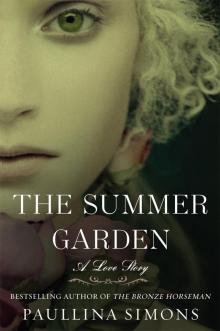 The Summer Garden
The Summer Garden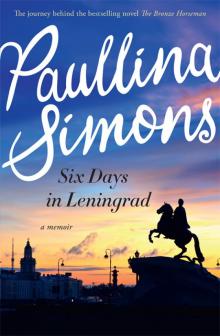 Six Days in Leningrad
Six Days in Leningrad Bellagrand
Bellagrand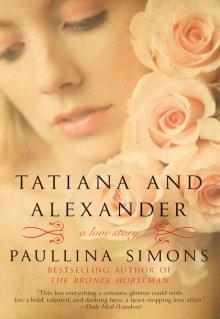 Tatiana and Alexander
Tatiana and Alexander Road to Paradise
Road to Paradise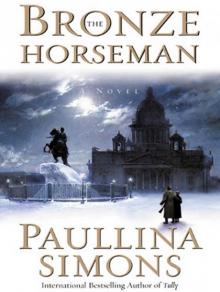 The Bronze Horseman
The Bronze Horseman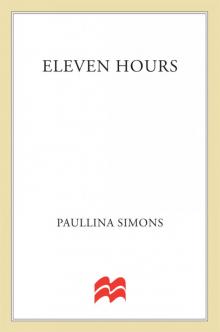 Eleven Hours
Eleven Hours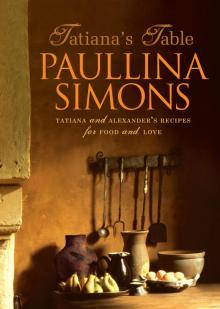 Tatiana's Table: Tatiana and Alexander's Life of Food and Love
Tatiana's Table: Tatiana and Alexander's Life of Food and Love The Girl in Times Square
The Girl in Times Square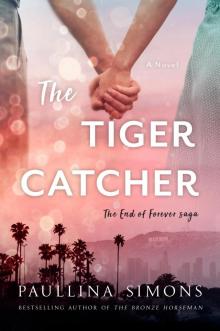 The Tiger Catcher
The Tiger Catcher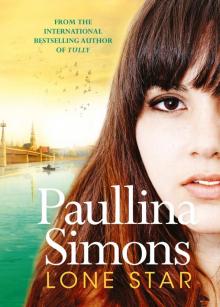 Lone Star
Lone Star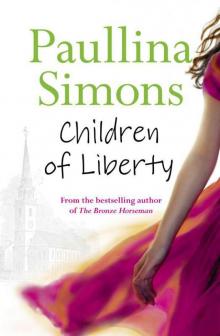 Children of Liberty
Children of Liberty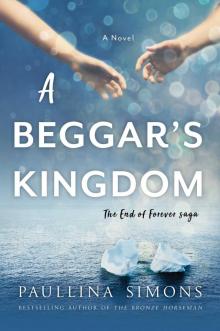 A Beggar's Kingdom
A Beggar's Kingdom Inexpressible Island
Inexpressible Island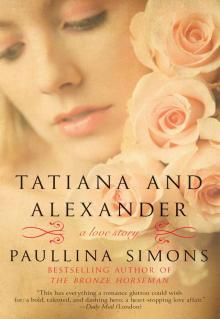 Tatiana and Alexander: A Novel
Tatiana and Alexander: A Novel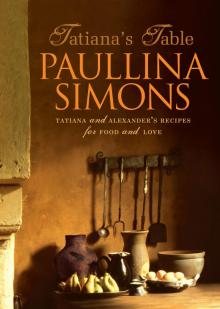 Tatiana's Table
Tatiana's Table A Song in the Daylight (2009)
A Song in the Daylight (2009)